Archives
-
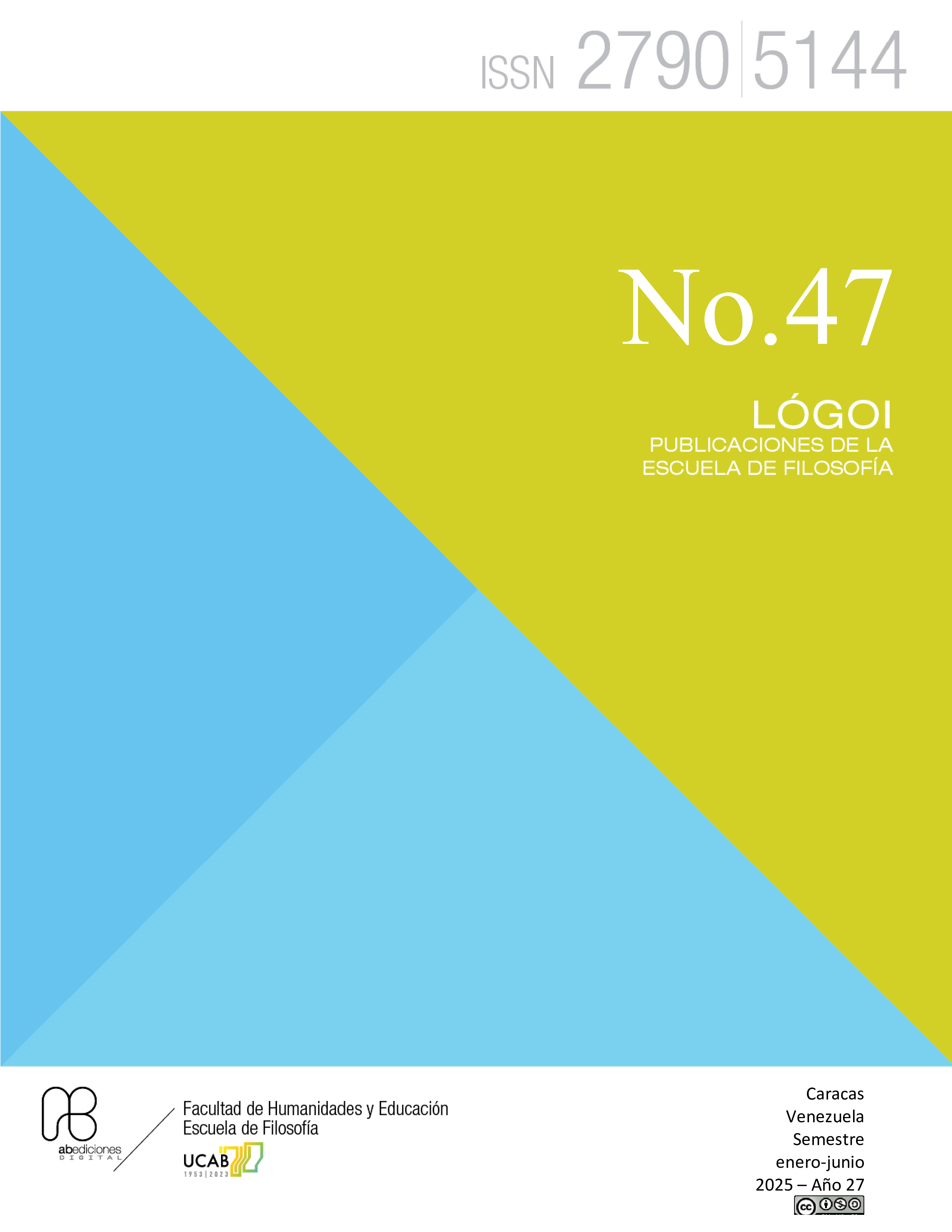
N. 47 (2025) enero-junio. Lógoi. Revista de Filosofía
No. 47 (2025)This issue 47 of L'ógoi. Revista de Filosofía gathers different reflections on philosophy, culture, identity and ¿Hispano-American?, ¿Latin-American?, ¿Ibero-American?, ¿Indo-American? art. It is pertinent to point out that, in the articles included in this volume, the authors do not offer a unique vision on the nomenclature used to call and culturally group the territories of the Americas. Nothing strange; since, as Arturo Uslar Pietri rightly pointed out, to mention one individual among a long list of intellectuals who have insisted on this point, we have not been able to agree on finding a unique and satisfactory name for our continent. Hispanoamerica, Latinoamerica, Iberoamerica, Indoamerica, Spanish America and other terms appear in the texts of different thinkers, both European and American, who over the years have been concerned with understanding our culture - Hispanoamerican, Latin American, Iberoamerican, Indoamerican, Latin American, Iberoamerican, Indoamerican? It should therefore come as no surprise that the contributors to this publication have different criteria. It should also be emphasized that, if the question on this matter were put to us, we would not hesitate to affirm that the most pertinent denomination is Hispanoamerica; but this is now irrelevant and this is not the place to discuss the reasons for our point of view. Any justification would exceed the limits that have been set for this preamble.
-
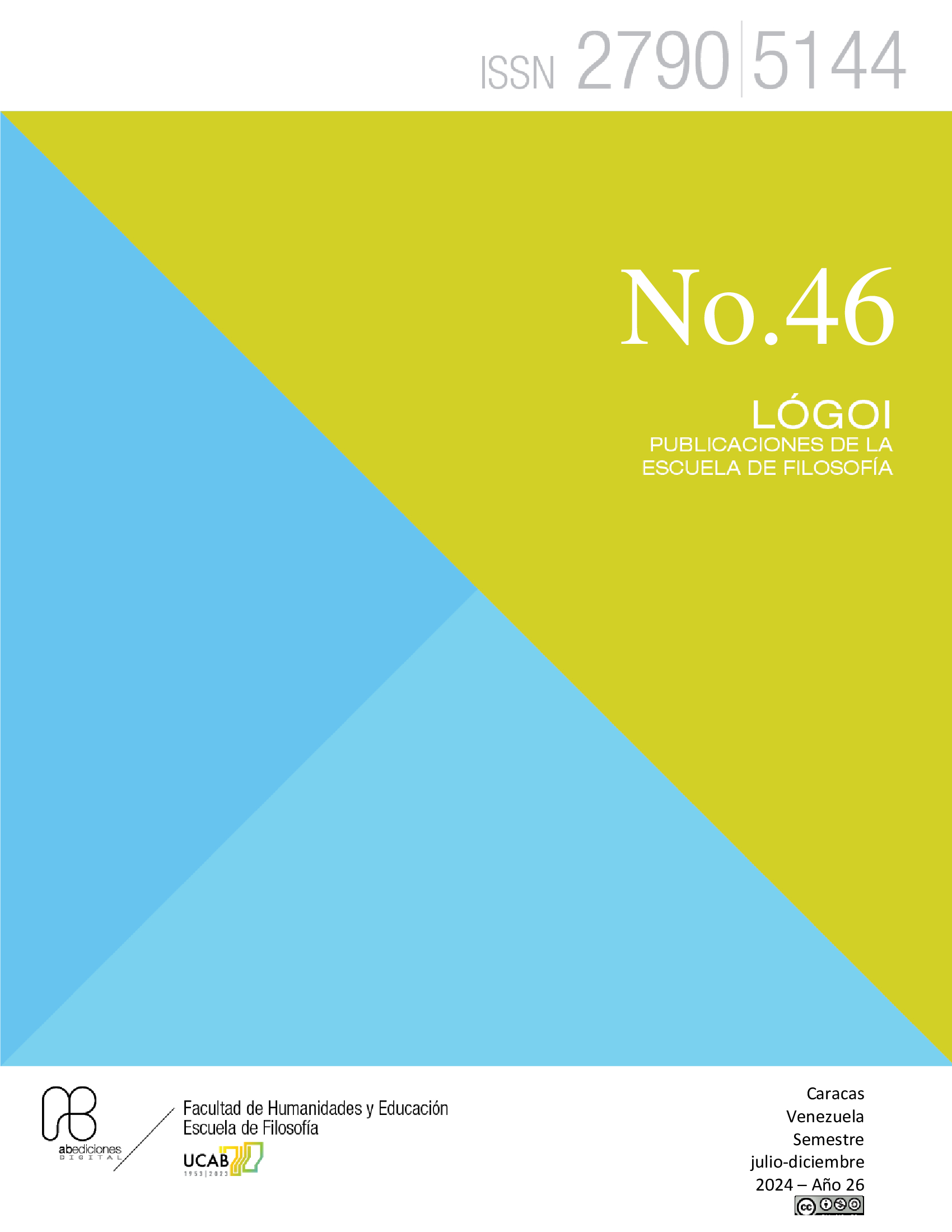
N. 46 (2024) julio-diciembre. L´´ogoi. Revista de Filosofía
No. 46 (2024)Emerging from the intellectual ferment of the early 20th century, phenomenology, the philosophy of “accounting for” subjective experiences, has established itself as a cornerstone of contemporary thought. His profound contributions to the understanding of consciousness, perception, and intersubjectivity have resonated across diverse disciplines, shaping our understanding of the human condition. As we navigate the complexities of the 21st century, the importance of phenomenology remains unchanged. Issue 46 of Lógoi, Revista de Filosofía is titled “Phenomenology in the 21st century: perspectives and problems” and attempts to be an effort to delve deeper into the multifaceted landscape of contemporary phenomenology, exploring its diverse perspectives and the pressing problems it faces.
From Husserl's transcendental phenomenology, with its emphasis on the constitution of experience, to postphenomenological currents that extend the scope of phenomenological reflection to corporeality, affect and embodied intersubjectivity, even towards themes that, at the time, were considered exclusively theological, this issue shows the rich tapestry of phenomenological approaches. We also examine the challenges facing phenomenology in the 21st century. These include the need for dialogue with the natural and social sciences, the importance of rethinking the religious in a time understood as “postmodern”, the task of addressing the complexities of contemporary social and cultural life, as well as the search for practical applications that contribute to a better understanding and intervention in various spheres of human existence.
-
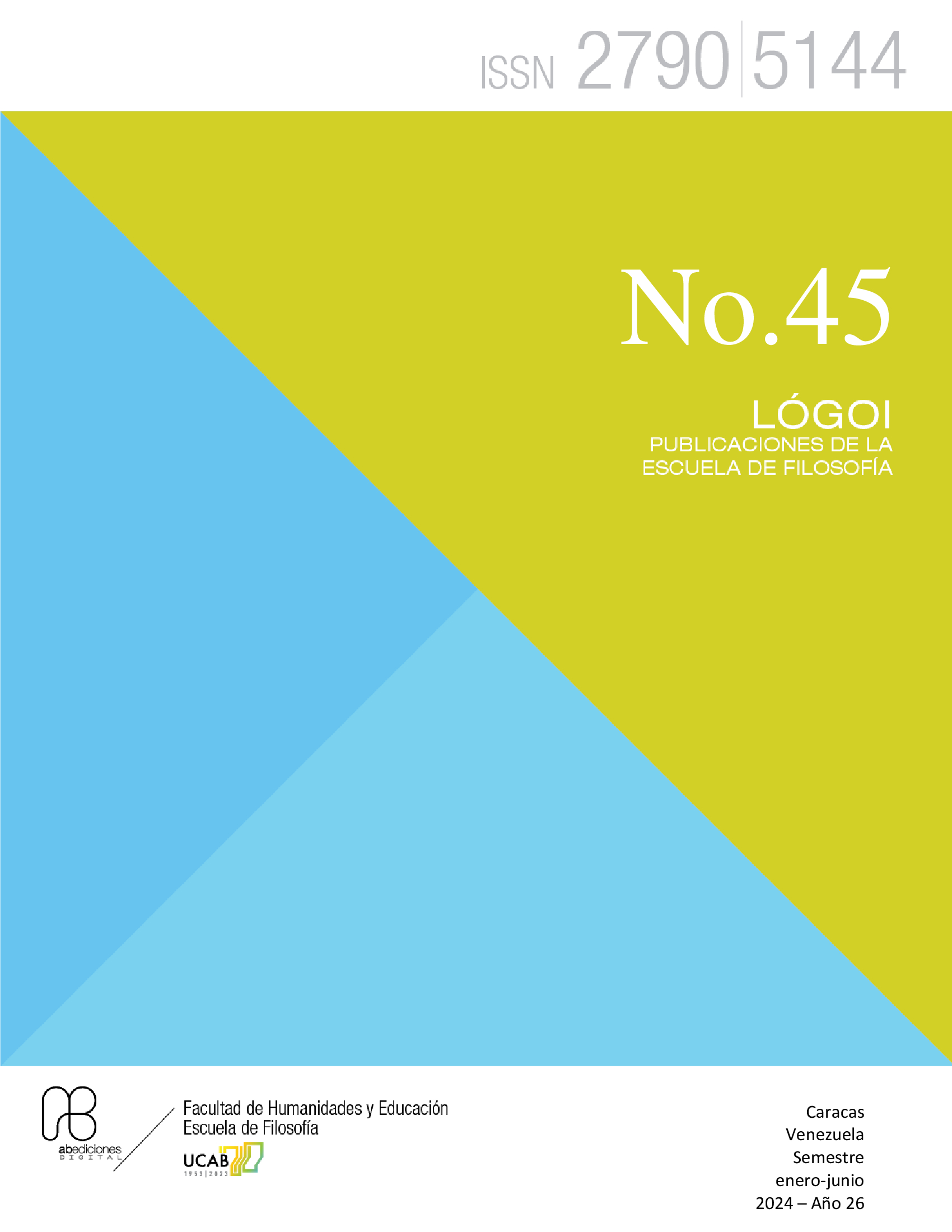
N. 45 (2024) January-June. Lógoi. Revista de Filosofía
No. 45 (2024)In his article "The part of cognitive science that is philosophy", Daniel Dennett (2009), building on the distinction made by Andrew Brook about the relationship between philosophy and cognitive science - namely, "philosophy in cognitive science" vs. "philosophy of cognitive science" - emphasizes the importance of philosophers contributing to cognitive science by addressing both the philosophical problems inherent in cognitive science itself and those arising from the interpretations it makes. Dennett acknowledges philosophers' past mistakes-as well as their arrogance-but asserts that philosophers can still play an important role in clarifying concepts, theories, and experimental designs, which ultimately advances scientific progress.
Additionally, Dennett emphasizes the need for constructive engagement between philosophers and scientists, advocating that philosophers offer testable implications rather than mere criticisms, and provides examples of collaborations between philosophers and scientists that have led to fruitful experimental designs and advances in the understanding of consciousness.
On the other hand, and in the same work, Dennett also criticizes the tendency of scientists to oversimplify philosophical concepts, such as "qualia" and the "Neural Correlates of Consciousness", emphasizing the need for a nuanced philosophical analysis in cognitive science. He suggests, for example, that the search for the "Neural Correlates of Consciousness" may be misguided - it may even be a futile search - and stresses the importance of philosophers in ensuring that scientific progress aligns with our moral and existential concerns.
In short, in his article Dennett argues for a symbiotic relationship between philosophy and cognitive science, with philosophers playing a vital role in refining concepts, designing experiments, and addressing existential questions raised by scientific advances. It is in the spirit of this defense that the present volume of Lógoi, Revista de Filosofía is inscribed.
-
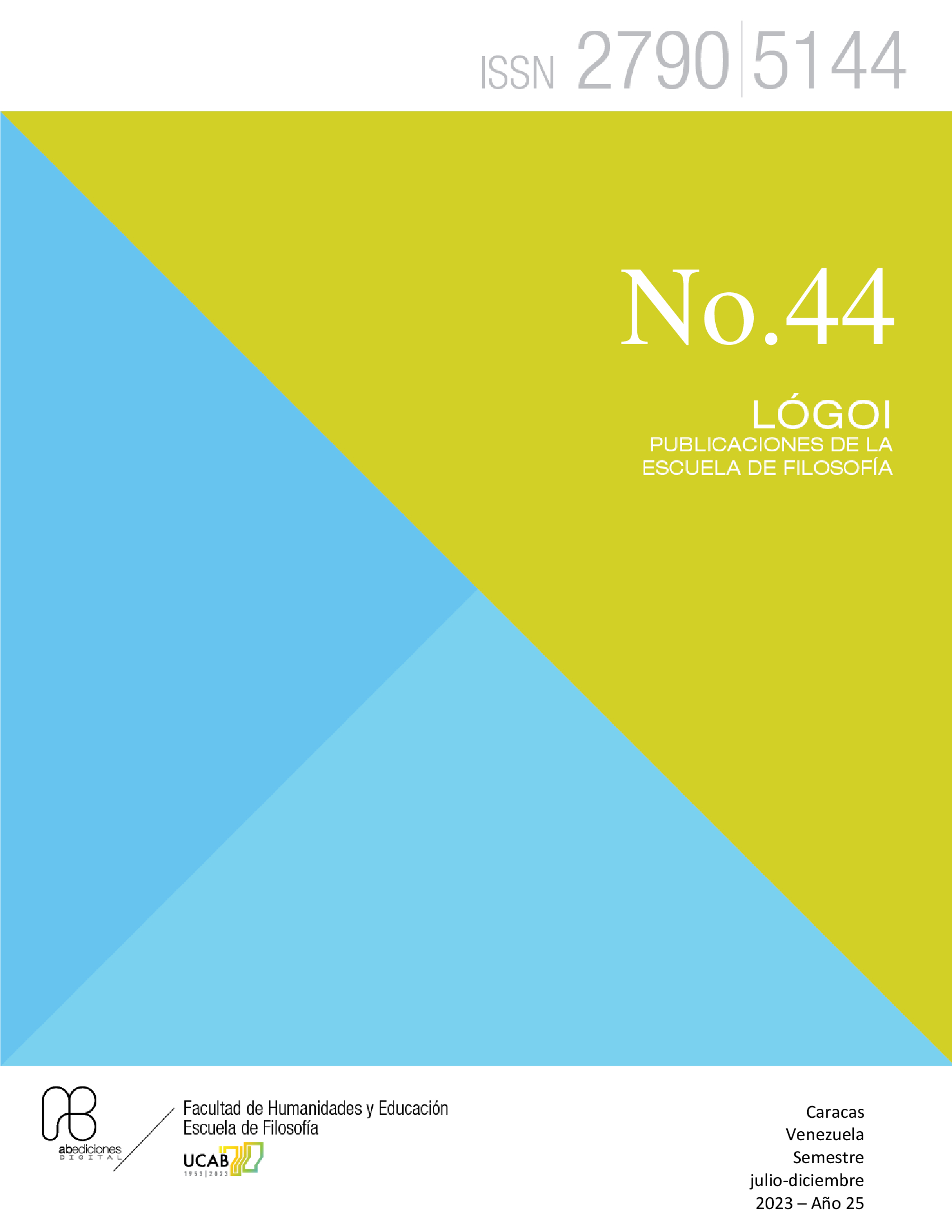
N. 44 (2023) julio-diciembre. Lógoi. Revista de Filosofía
No. 44 (2023)Moral reflection, although present in national and international events, and in different fields of knowledge, it is worth specifying some aspects that correspond especially to Moral Philosophy.
This knowledge wonders about the foundation of ethics: Why is there ethics? One answer: Because there is freedom, the capacity of human beings to choose, which implies responding to the decisions made and the acts performed. This exercise of freedom and responsibility is carried out both individually and socially. Without freedom, it would be very complicated to affirm that the human being is an ethical being, understanding that this is exercised within the limits of the humanity of this being.
Now, what is ethics or moral philosophy? The term ethics comes from the Greek ethos, which means custom, principle, character. Basically, ethics is a knowledge referred to morality, to the reasons given about the principles, values or norms that people or societies have. It is the philosophical discipline that reflects on the arguments that justify human action, in relation to what is considered good and bad.
In this context is located axiology, which is understood as the philosophical discipline that deals with the study of value, of the nature of value. Etymologically, the term axiology comes from the Greek words axios, which means value, that which is valuable; and logos, study, treatise.
Why are values important? It could be said that, among other reasons, values are important because they ratify life in community, guarantee the fundamental rights of man, define the ways of life of communities, serve as a guide for human action, lead to the moral development of people and to the common welfare.
-
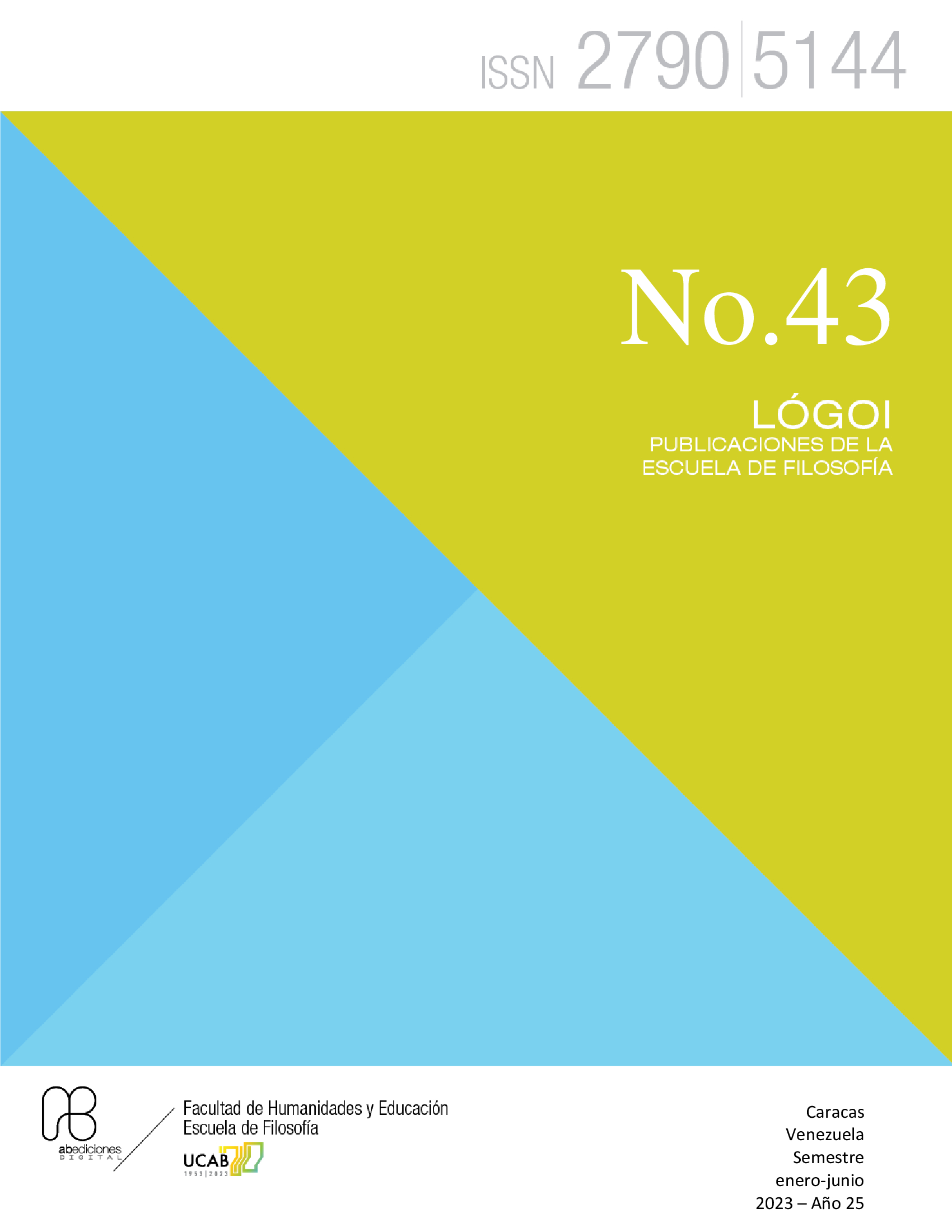
N. 43 (2023) enero-junio 2023. Lógoi. Revista de Filosofía
No. 43 (2023)To analyse, from the fields of study of each researcher - Anthropology, Epistemology, Aesthetics and Political Philosophy - the difficulties that fiction has in our times to carry out its usual task of augmenting reality and creating worlds. When truths easily become post-truths, narratives become narratives and arguments become narratives, the fundamental dialectic between fiction and reality that runs through our most human condition disappears into a grey and confused territory where it is difficult to distinguish between one and the other. In such a context, the branches of knowledge and the subjects of study, from their own particular framework, nevertheless face common problems. For this reason, the articles presented in this Monograph do not attempt to analyse a single idea from different points of view, but rather, conversely, to show singular problems that affect the different perspectives and which stem from these difficulties in moving today between fiction and reality.
-
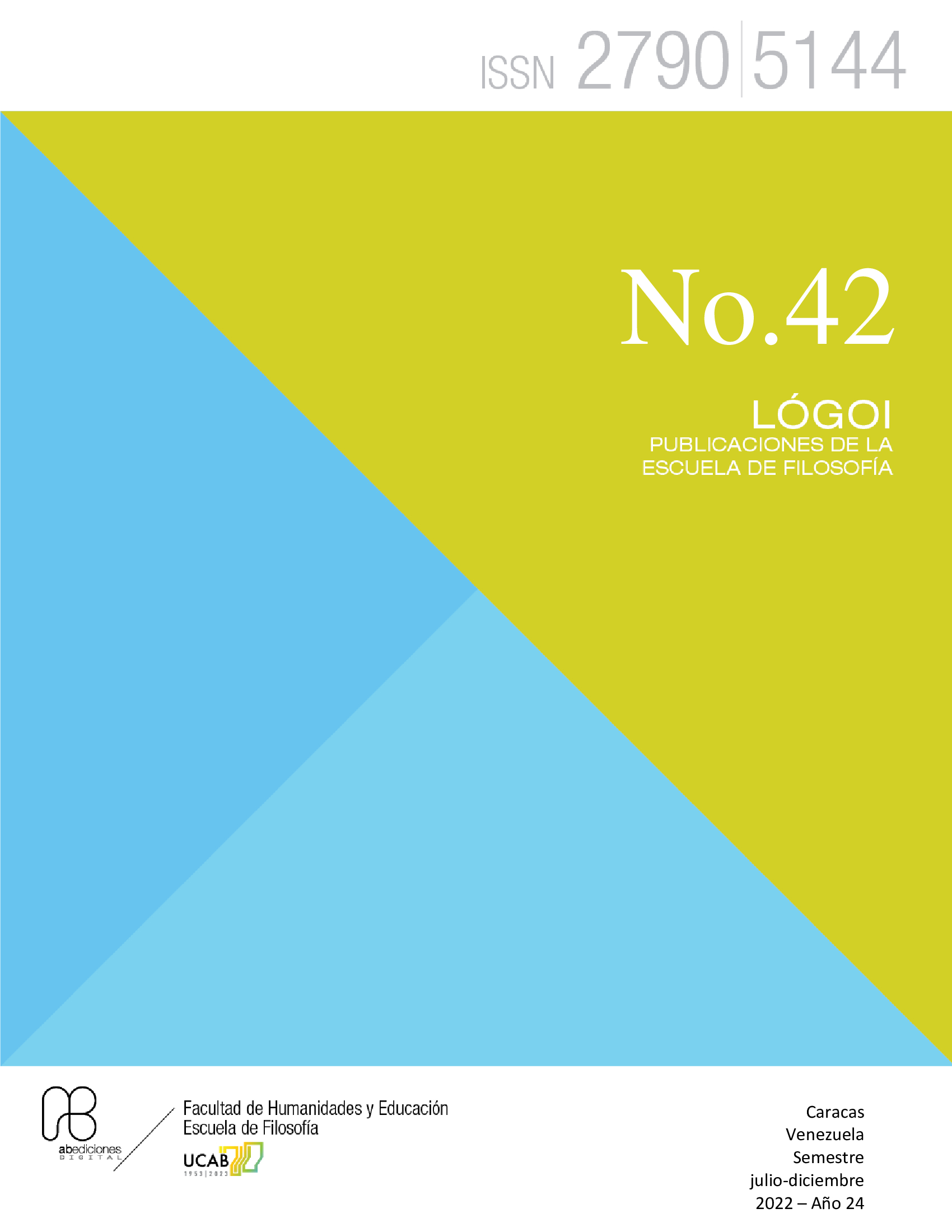
Núm. 42 (2022) julio-diciembre 2022. Lógoi. Revista de Filosofía
No. 42 (2022)Why this name: “Reality and process”? Well, as we know, in the 20th century the contributions of physics, astrophysics, biology, etc., in the task of unraveling the ultimate nature of reality were enormous, philosophy and metaphysics in particular joined that conceptual tsunami with contributions from different philosophical currents of thought, but in particular the so-called "philosophy of process" was at the forefront of the new vision of reality: relational, dynamic and non-substantialist in the classical way. Alfred North Whitehead, from the United States, provided a "Metaphysics of the organism" with a categorical apparatus capable of coexisting with science and even completing its analyses. The capital work of the English philosopher and mathematician, Process and reality, contains his scientifically well-informed philosophical position. It is in honor of this foundational work that Reality and process is entitled in this way, making a nod to that milestone. The members of this research group guide our metaphysical thinking from a dynamic and complex vision of the world, but emphasizing the idea of reality as the protagonist of the research, leaving open the consideration for various forms of dynamism, since the process is only one of the forms, not the only one. Hence the name. It is worth saying that, at present, it is developing its second season, and in this issue we present some results of the first. This first season has been driven by the reading of the book Dynamic Structure of Reality, Xavier Zubiri's main work, not to specialize in his thought but to get into the topics presented there and, with them, be able to give them a current, non-school treatment. , academically robust, critical and scientifically knowledgeable. Something unusual among expert scholars. This work was used as the common thread of our transdisciplinary dialogue carried out by more than one philosophical tendency and more than one branch of science. The objective has been to allow an authentic productive conversation between science and philosophy, leading to real contributions. Why X.Zubiri? Well, because the importance and relevance of the Spanish philosopher to think deeply about reality, accompanying current sciences, is unquestionable. I will mention just one example of the influence that Zubiri exerts on recognized philosophers of Whiteheadian processual lineage in our 21st century. -
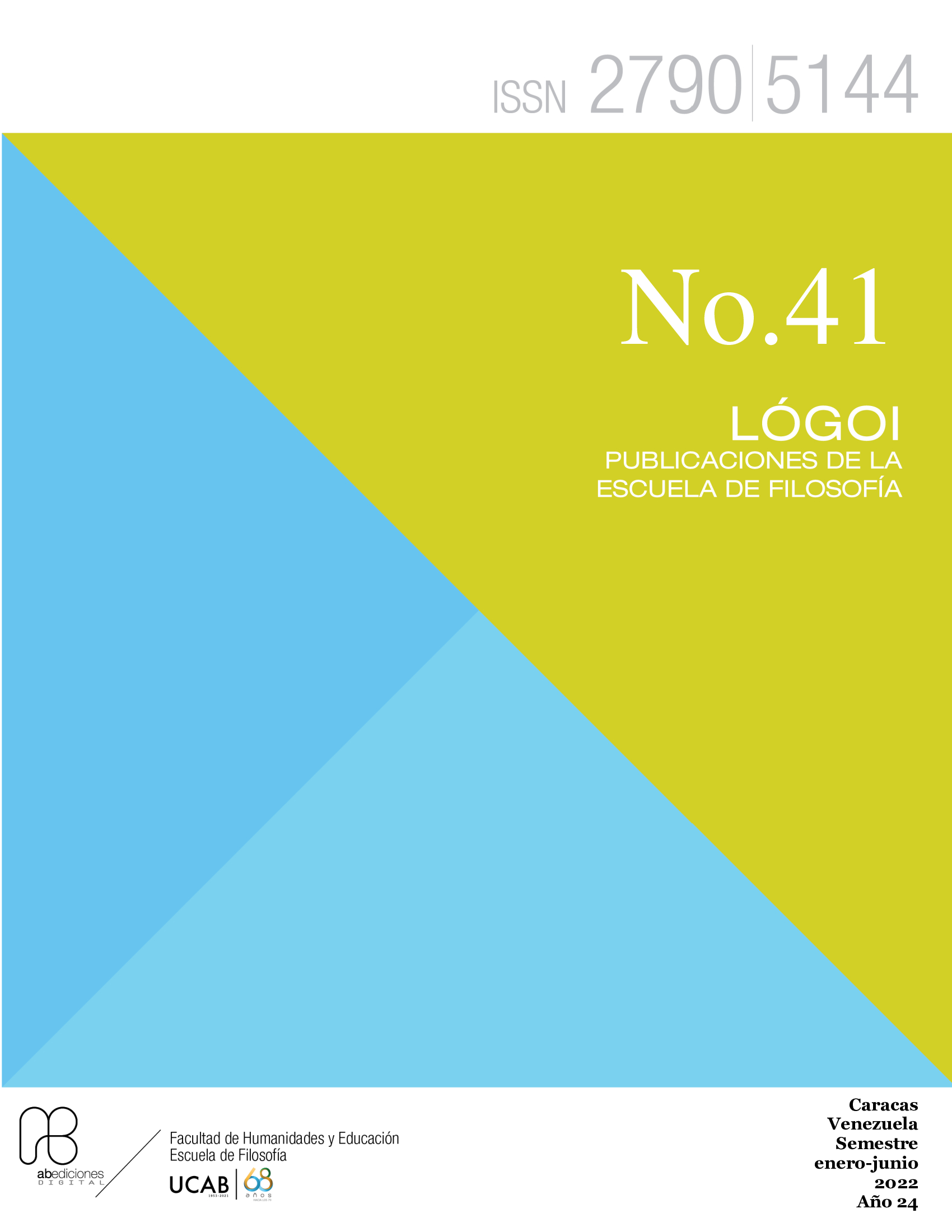
Núm. 41 (2022) enero-junio 2022. Lógoi. Revista de Filosofía
No. 41 (2022)The study of economics and philosophy is not something new, but in recent years academia has resumed its interest in the relations between these two disciplines, beyond a deontological perspective, including political economy and its relationship with political philosophy, methodology and the epistemology of economics. or the ontology of economics. The morality of economic decisions can contribute to a better understanding of the study of economics, not only because it incorporates the ethical dimension, but also because it allows economists to comprehensively analyze the way in which their arguments are constructed and presented, incorporating the study of rationality into the analysis. There are many points of convergence between economics and philosophy, and in particular with moral philosophy: both are interested in intentional human action, which seeks to achieve ends or objectives proposed to generate individual and collective well-being[3], based on moral principles, or on hedonistic morality, in other cases on Aristotelian ethics, in the morality of Hobbes and Locke or in the Kantian ethics of duty, assuming different types of rationality, as Professor Cortina suggests, and thus admitting the possibility of attitudinal learning, in the sense that agents acquire knowledge about what should or should not be done, which can influence the formation of preferences. In particular, there are various approaches to ethics and economics based on the socio-political approach proposed by Guzmán Cuevas, evaluating the consequences of economic policies for individual and collective well-being, or studying externalities based on a rational analysis by an economic agent who is well informed. Another approach that has been studied in the framework of the relationship between philosophy and economics is related to agents who engage in altruistic behaviors. The treatment of altruism by authors such as Gary Becker is somewhat restrictive, but at least it recognizes what Martin Buber calls "the dialogical principle", understood as "the substantial presence of the other", which questions both the individualist and the collectivist position, and which also incorporates human motivations that go beyond the search for individual well-being with a sense of efficiency. that is, to use Argandoña's terminology, intrinsic motivations, where the agent is willing to accept the opportunity cost of carrying out actions that do not maximize their instantaneous utility, or transcendent motivations, which seek the good for other agents. -
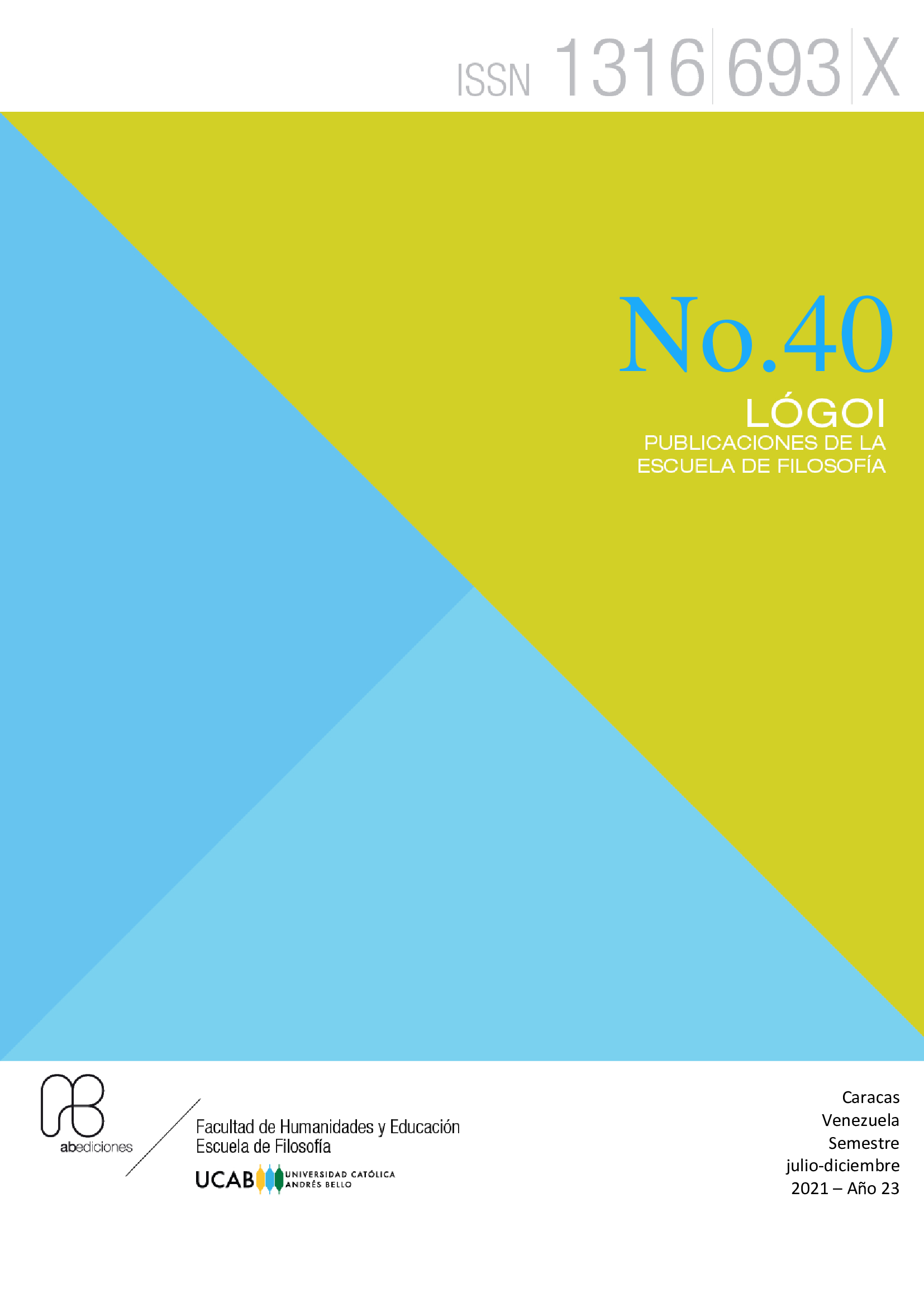
Núm. 40 (2021) julio-diciembre 2021. Lógoi. Revista de Filosofía
No. 040 (2021)Dedicated to Antonio Pasquali, the themes of this volume seek to reflect on that evident link between reality, philosophical thought and the expressive-communicative need of being in relationship. Philological matter, philosophical reflection, the creation of the spirit are intertwined to understand the world and communicate it. It is a nexus that resides discursively in all fields of human development, in addition to its correlation in culture and communicational processes, areas widely developed by Antonio Pasquali, who assured that any facet of cultural work is necessarily linked to communication. Culture and communication represent the obverse and the reverse of the same process, as well as communication and community, a pair involved in a concomitant relationship. Pasquali postulates communication as a sociocultural interaction of the 'political animal' (being cohabiting in a 'polis'). Communicating is "the essence of human coexistence, community and sociability" -
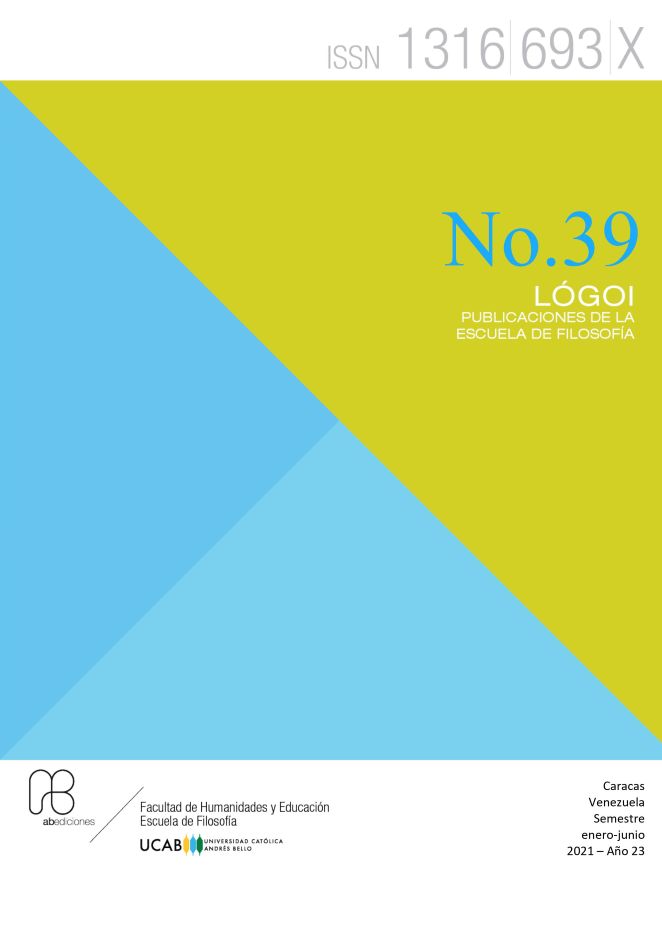
Núm. 39 (2021) enero-junio 2021. Lógoi. Revista de Filosofía
No. 039 (2021)Free will, agency, and moral responsibility. In the extensive list of problems that remain active in philosophical research, free will, and its connection with the ideas of agencyality and moral responsibility, among others, is undoubtedly positioned among the first places. The issue is not only an ancient question that is still open and unresolved; It has become over the last sixty years, especially during the last four decades, a matter of dynamic and fascinating debate. The classical doubt about whether our futures are already decided by a priori causes, an assumption that can have varied metaphysical significance, or whether, on the contrary, human action, and the effects that it entails, can intervene in the structured arrangement of what is and will be, thereby overflowing predetermined events -which also has its ontological weight-, it continues to keep the controversy very much alive. The magnitude that this dilemma has acquired is extraordinary and is evidenced by the inexhaustible literature available not only in the field of philosophical research, but also in that of different scientific areas. Developments in free will are largely analogous to studies in consciousness, another big philosophical topic on the to-do list. An elementary intuition about free will has been the presupposition that consciousness is necessary: we need to be aware of the volitional acts of which we are capable as a precondition for deliberating and choosing between possibilities. Although this is only one of the many aspects to address when dealing with free will, it is important to mention it because it is the one that has caused the subject to exceed the limits of philosophy in our times and motivated the interest of other disciplines. -
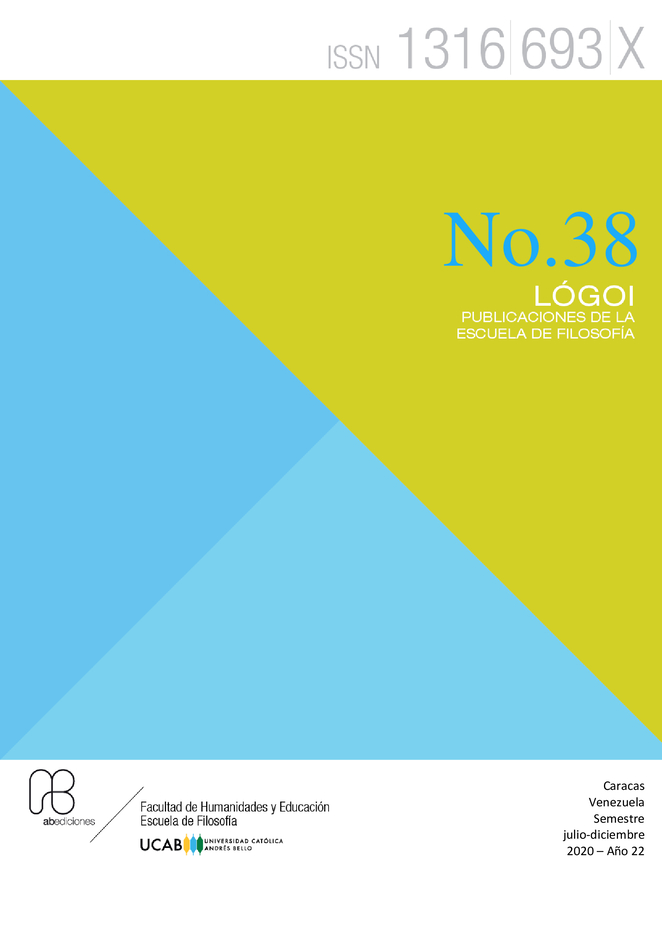
Núm. 38 (2020) julio-diciembre 2020. Lógoi. Revista de Filosofía
No. 038 (2020)Arguing about Argumentation Theory... One of the activities we do most naturally is arguing. We do it daily, on different occasions, and with this we also carry out the task that goes hand in hand with argumentation, and that is none other than the evaluation of arguments, whether they are our own or others'. We argue to allege the reason for our beliefs; We argue to persuade someone, to accuse or defend, to support a proposal, or to challenge it. When arguing we can have different intentions, but there is a common aspect to these different purposes, and that is that when arguing we seek to persuade or convince someone of something. The social communicator, the lawyer, the sociologist, the political scientist, the educator, just to name a few professionals, carry out their functions through continuous argumentation. It informs, defends or accuses, analyzes, teaches, persuades, in short, argues; the success of his work lies in the good use he makes of his "argumentation"; however, I am afraid that an overwhelming majority of these professionals have never approached what is known today as Argumentation Theory. In all areas of work and personal life, we put our discursive capacities into play by aiming at different objectives: to enforce a proposal for action, to justify a decision already made, to solve a dispute, to negotiate a favorable agreement, etc. In any of these situations we need to resort to argumentative tools that serve both to manage and communicate the information we have, and to evaluate the alternative arguments of those who are part of the process. Even so, we can perceive that, in general, in our academic circles there is a certain indifference with respect to studies on argumentation and this is inexcusable, taking into account that in order to exercise their own reflection they need arguments. A short time ago, a group of Ibero-American scholars of Argumentation Theory began the process of creating the Ibero-American Society of Argumentation within the framework of the First Ibero-American Congress of Argumentation, held in August 2019, at the EAFIT University, Medellín, Colombia. There, the next steps to be taken in order to make this creation a reality were discussed; a few weeks after that Congress, a gigantic effort carried out by José Alhambra Delgado and Hubert Marraud (UAM) stands out, who have given us an extraordinary bibliography of argumentation theory in Spanish, which can be consulted in http://sibarg.org/bibliografia-de-teoria-de-la-argumentacion-en-espano. We also circulated a list of various journals where researchers' articles could be published, which obviously meet the requirements of each of these publications. -
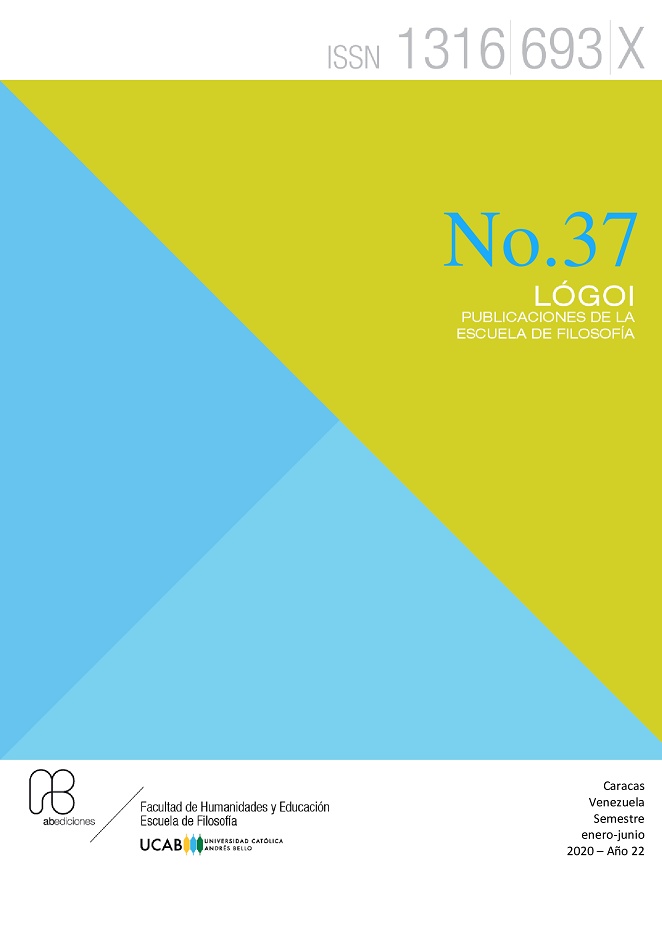
Núm. 37 (2020) enero-junio 2020. Lógoi. Revista de Filosofía
No. 37 (2020)From the second half of the twentieth century to the present day, we have lived philosophy in an atmosphere of passage, of journey, of a path that announces a course towards other times. We crossed worldviews, languages, systems, truths that began to be revealed in "crisis", that gave way to other ways of thinking about the world and that, in different ways, we knew as postmodernity. Our reflections took place in the midst of borderline airs, of discussions with the ‹‹past››, of claims, while we understood that philosophy was revealed to be closer to the body, to dialogue, to the rhizome or deconstruction. These reflections built bridges to profoundly review our epistemologies, to recognize ourselves as diverse and situated – and not pure consciousness or transcendental – to think about the plural without separating ourselves from the world, diluting otherness, dualisms and finding perspectives. That postmodernity, moreover, did not mean a "transition" – at least not until now – towards a new adjustment, towards another stable terrain, of accommodation, as some voices dreamed of imagining the postmodern era as a kind of Renaissance. Nothing obliges the different paths of revision and change to lead us to another time of foundations, to another project that orders our lives; That aspiration still evokes, secretly, modern times. Although we cannot guarantee that it will not happen either. Those complex revisions at the end of the century and the beginning of the millennium, which did not show the desire to found or substantiate, which met the Olympic force of technology, have allowed us to reach these amazing times that we are going through today, which are distinguished, very especially, because they announce the "past". Because they predict the new or what will undoubtedly come. Times in which there is no longer a proper dialogue with what has been thought or what happened, but rather announces what has been left behind.
Although the Renaissance or modern "new times", for example, assumed the same in relation to their predecessors, we, however, are facing an unstoppable irruption of the dominance of the Latin prefix post. Post-truth, post-photography, post-present, post-democracy, post-enlightenment, post-anthropocentrism, posthumanism... et alia. It was never easy to define postmodernity, at least in a clear and shared sense. But in the face of post-postmodernity, that may no longer be relevant. But of all the posts that visit us, or that we visit, we have to think philosophically about one, posthumanism. We cannot trace precise times, but it is, as is well stated, the philosophy of our time. That primacy of the post, ‹‹after››, necessarily leads us to the question: what is it that we so insistently want to leave behind? Or, in a more posthuman tone, what are the things that must be left behind? The plural is important. And each one, from their craft and reflection, will tell us what is implied in this farewell to photography, the Enlightenment or the truth. In the case at hand, the farewell is to "the human", to the humanities. We must know, then, what we are abandoning and what comes "after". From the perspective of posthumanism, the notion of the human, of man as we have conceived him until now, is being rethought, deconstructed, unveiled—with Nietzschean, Foucaltian, Deleuzian legacies, among others—while we aim for a new understanding. We can begin to raise it from the ecological awareness of our times, the urgency of correcting our excesses against nature, the decisive irruption of technology, reflection and openness towards the plural and the diverse. In this meeting of consciences and changes, there has been an urgent need to rethink what is human.
-
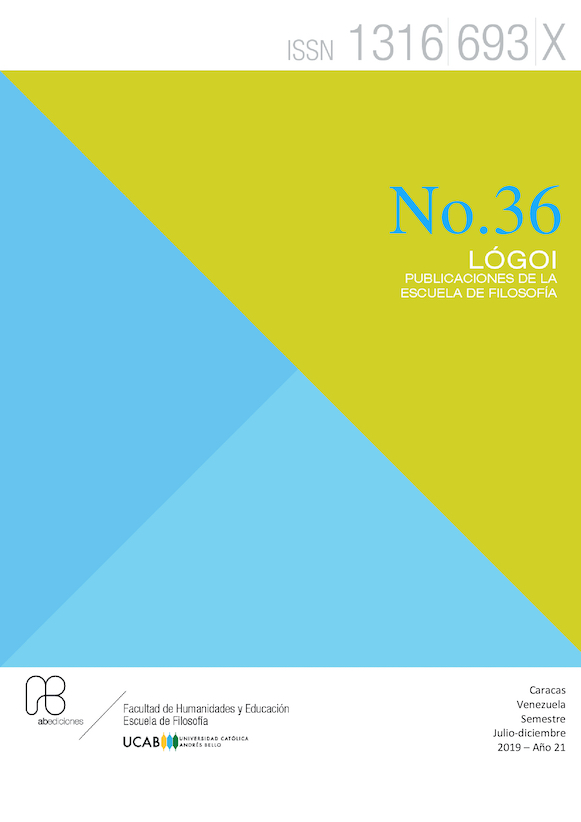
Núm. 36 (2019) julio-diciembre 2019 Lógoi. Revista de Filosofía.
No. 36 (2019)This edition offers a varied selection of works of high intellectual invoice, which is why we cordially invite you to consult them, hoping that it will be useful for students and teachers of philosophy. The work entitled: Metaphorical Habitat. Epistemological Consequences of Approaches, by Deborah Rodríguez, addresses metaphor as a central theme for the understanding of linguistic analyses. For their part, the works of María Di Muro, Carlos Contreras Medina and Gustavo La Fontaine are the result of a seminar given in the master's degree in Philosophy at the UCAB on epistemological aspects of Kant's Critique of Pure Reason, and represent an important effort to understand the German thinker. On the other hand, Professor Johanna Pérez Daza as a specialist in communications and photography dwells on the consequences of scientific dissemination as an epistemological problem, to which we must pay attention. Finally, Professor Lahoud's work invites us to dismantle some myths about the way of understanding the history of capitalism. -
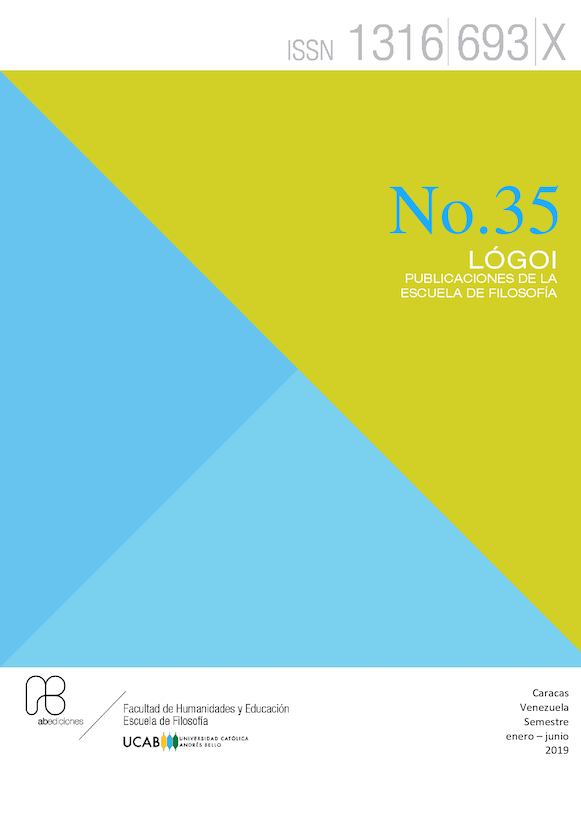
Núm. 35 (2019) enero-junio 2019 Lógoi. Revista de Filosofía.
No. 35 (2019)This edition is dedicated to the interaction between philosophy and cultural studies, a relationship that in the last five decades has been consolidated in the Anglo-Saxon academies and that finds its place of residence in the language and literature departments. On the one hand, cultural studies theorists find analytical tools in philosophy to address cultural materials, ranging from novels and films to graffiti, architecture, radio, fashion, video games, etc. On the other hand, in this analysis of social narratives that escape, most of the time, from traditional academic canons, cultural studies challenge philosophy and show it new fields to think about culture. In this edition, some of the interdisciplinary experiments that are being developed in the cultural studies of the 21st century will be presented, and that enter into direct dialogue with philosophy.
-
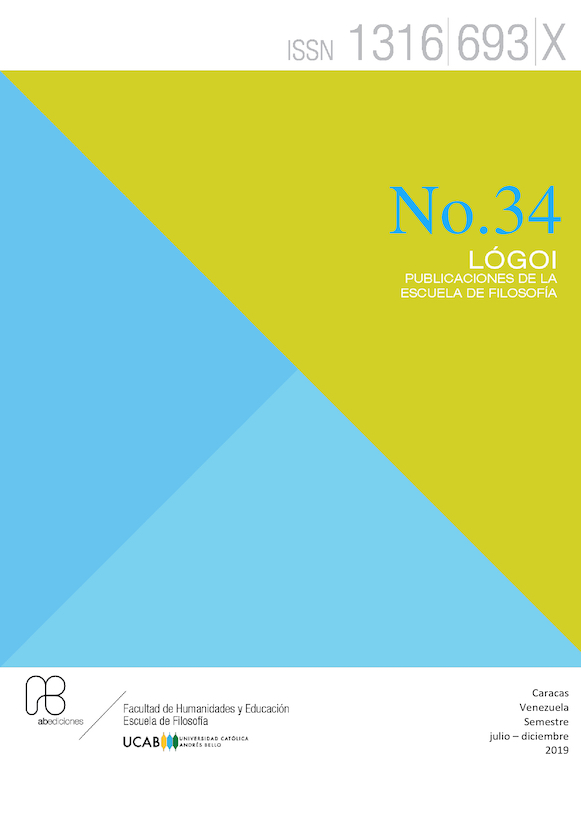
Núm. 34 (2018) julio-diciembre 2018 Lógoi. Revista de Filosofía.
No. 34 (2018)Simón Narciso Rodríguez (Caracas-Venezuela, 1769, Amotape-Peru, 1854) was a philosopher, writer, politician and educator whose work is the object of reflection of the group of articles that make up this new issue of Lógoi. Philosophy Magazine. This famous American from the 18th and 19th centuries, a thinker of great originality for some, Voltairean or emulator of Rousseau, for others, although more (un)known to Others, like the “Master of Bolívar”, had a hectic existence, hit by hardships. economic and, in his own words, by the contempt of his countrymen. He traveled through America and Europe, he lived for more than two decades in the Old Continent and returned to the New attracted by the opportunity to serve with his knowledge and his pen the cause of consolidation of freedom in the new Latin American republics. Some republics whose uncertain destinies tormented him and which therefore prompted him to verify and reflect on the state of their customs, their political systems, economic and its serious social problems. The bulk of Simón Rodríguez's writings, as the careful reader can verify, They have their reflective gaze on how to “found the Spanish American republics” that They have been “established” by force and military power. For Samuel Robinson, another name that Rodríguez used for many years, the time that follows the armistice is that of work of thought. A work that must focus on observing, meditating and reflecting on American societies to then propose courses of action in the political, economic and social. The issue of the day, argues Rodríguez, is the establishment of civil liberty, a stage superiority of political independence achieved in the stage of revolutions Hispanic Americans.
-
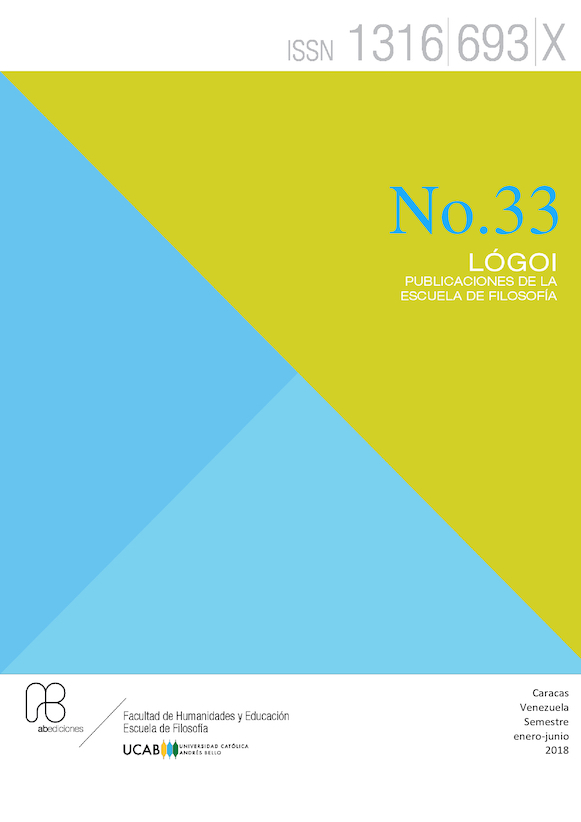
Revista Lógoi. N°33 Revista de Filosofía
No. 33 (2018)Advances in science, during the 20th and 21st centuries, cause immense confidence in its success and its universality. They affect the research on the logic of science, the scientific method and our conceptions of what a scientific theory is and its experimental methods; They also provide a healthy tension between the philosopher's ways of arguing and his scrutiny about the empirical sciences. They are constantly stirred and renew many of the philosophical foundations on which The traditional argument rested on our phenomenology, ontological assumptions, epistemology and flow of history. The extension of argumentative forms that contributed mathematical logic, linguistics, the theory of sets, model theory and the new premises of empirical sciences, provide the current philosophy of science and language, greater expressive power and precision in the approach, evaluation, demystification and correction of the problems of classical philosophy. The evaluation of the truth of the philosopher's premises are constantly contrasted with the advances in scientific theories and models became a much of the typical argument of today's philosopher. Advances in scientific theory broadened our perspective argumentative and they gave us new canons for the establishment of evaluative criteria of the classical problems of philosophy. The works in this volume are a sample of what that is sustained here. They deal with some classic problems of mind-body philosophy, phenomenology and ontology traditional with the new perspective of the plot scaffolding always in view of current scientific developments.
-
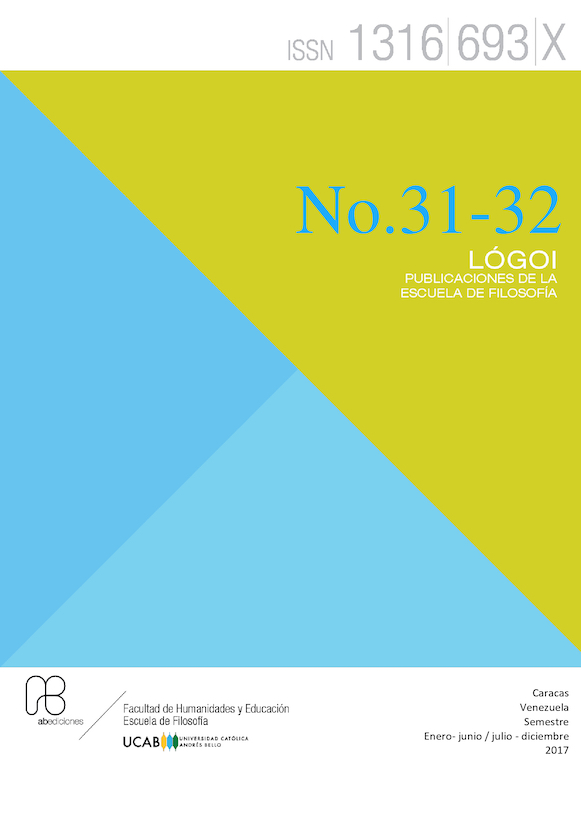
Revista Lógoi. N°31/32 Revista de Filosofía
No. 31/32 (2017)A few years ago we had the idea of proposing to Logoi magazine the publication of an issue that would report on the studies of ancient philosophy carried out in our country. We thought, as we continue to think now, that it would be useful to show the work of those who here dedicate themselves to this discipline, somewhere between philology and philosophy, and who in Venezuela have had teachers of the stature of Juan David García Bacca, Miroslav Marcovich, Guillermo Thiele, Ángel Cappelletti, Blas Bruni Celli or Francisco Bravo
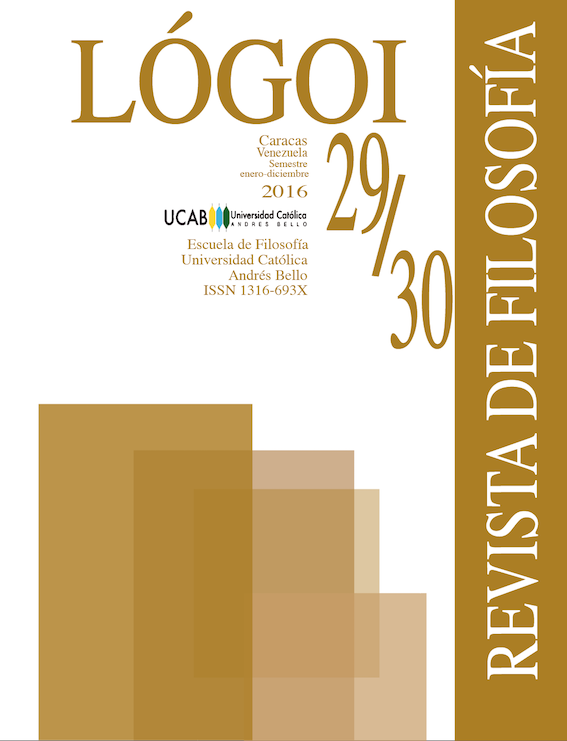
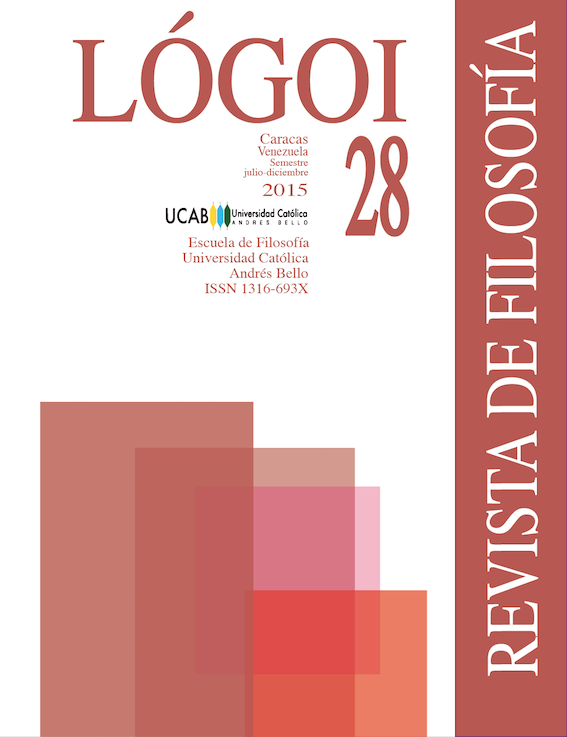
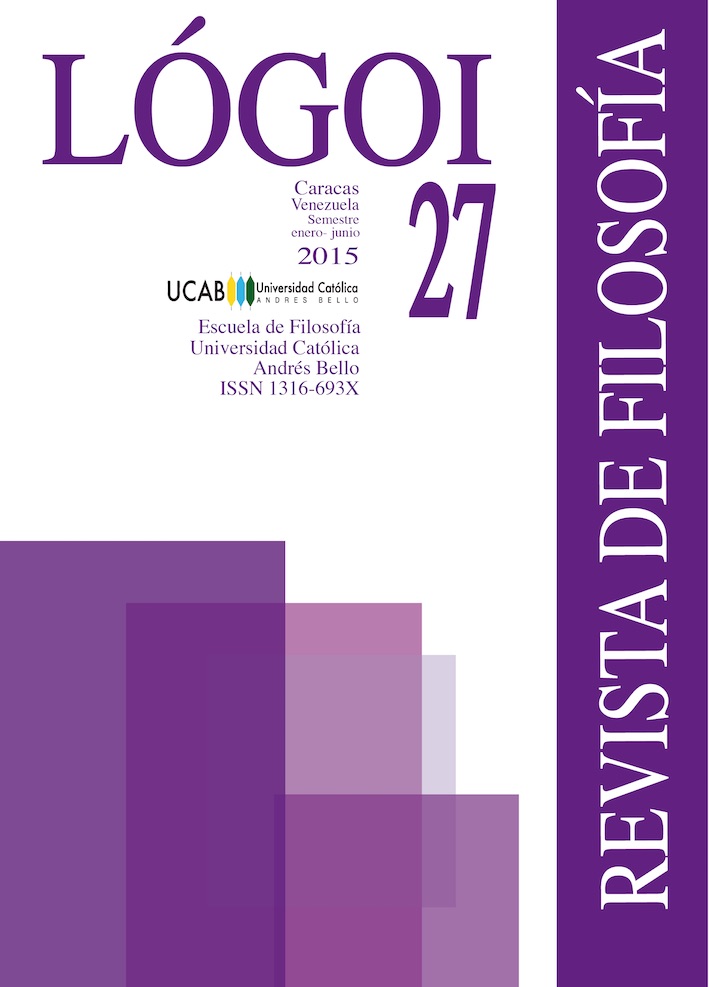
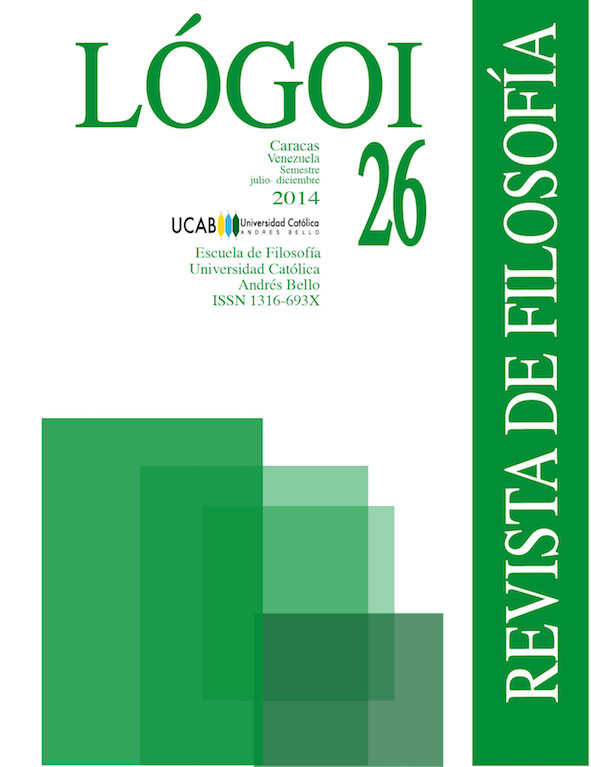
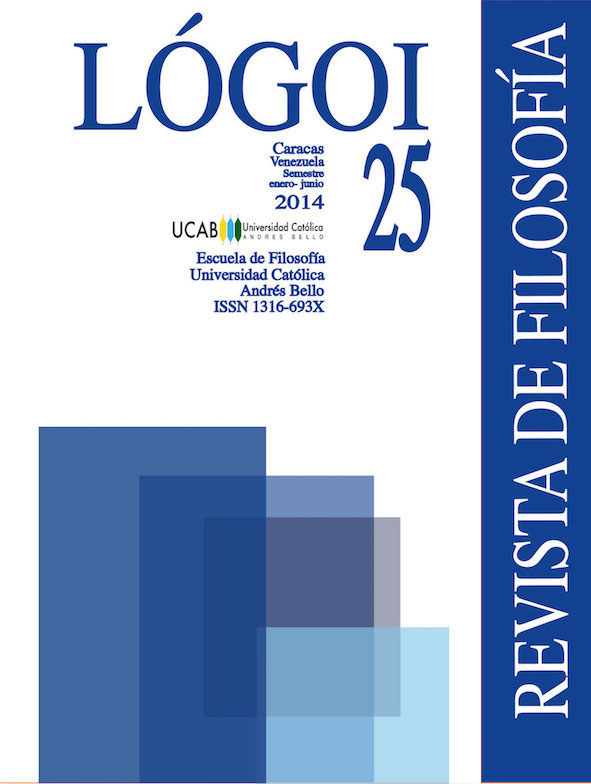
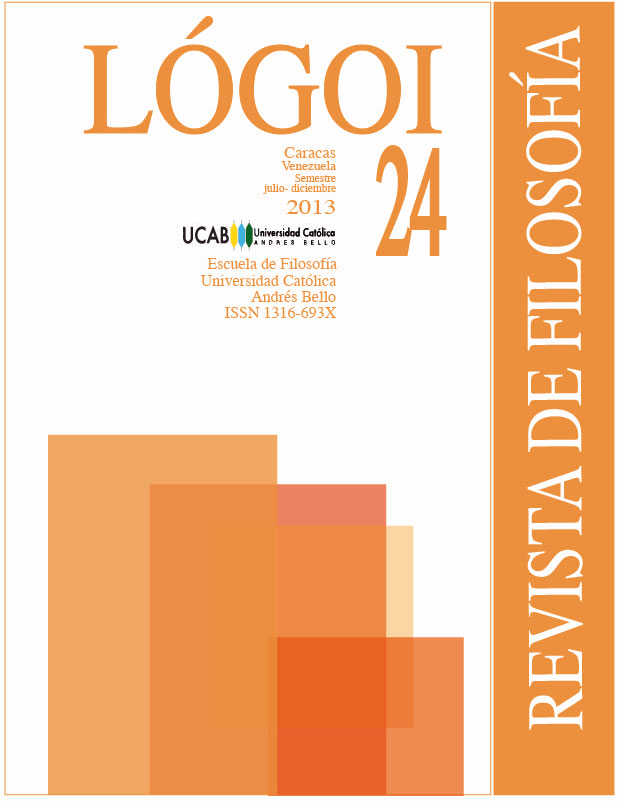
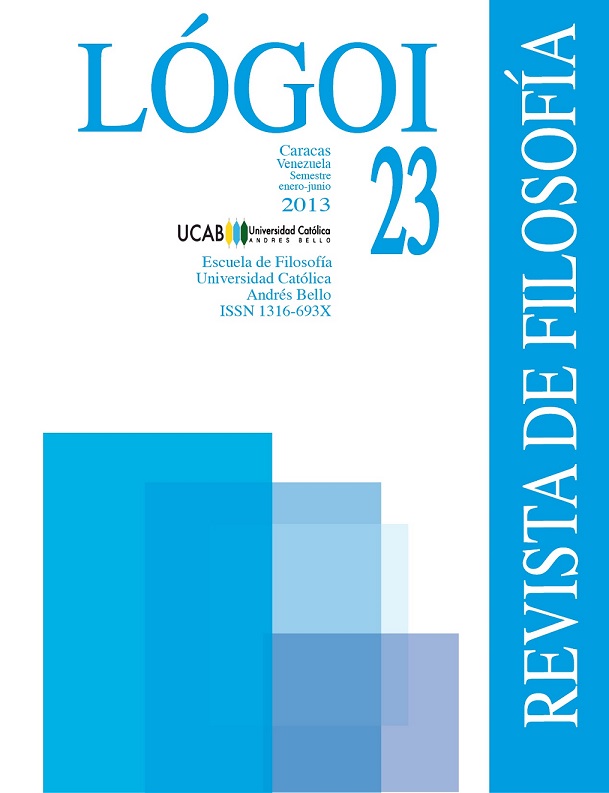
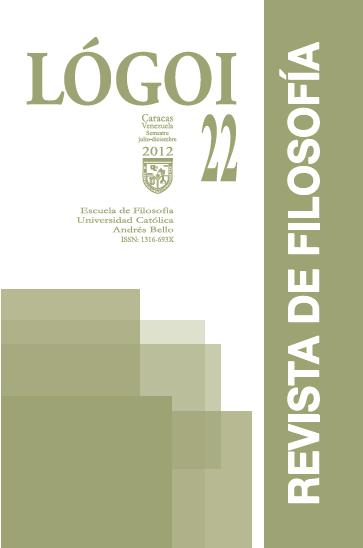
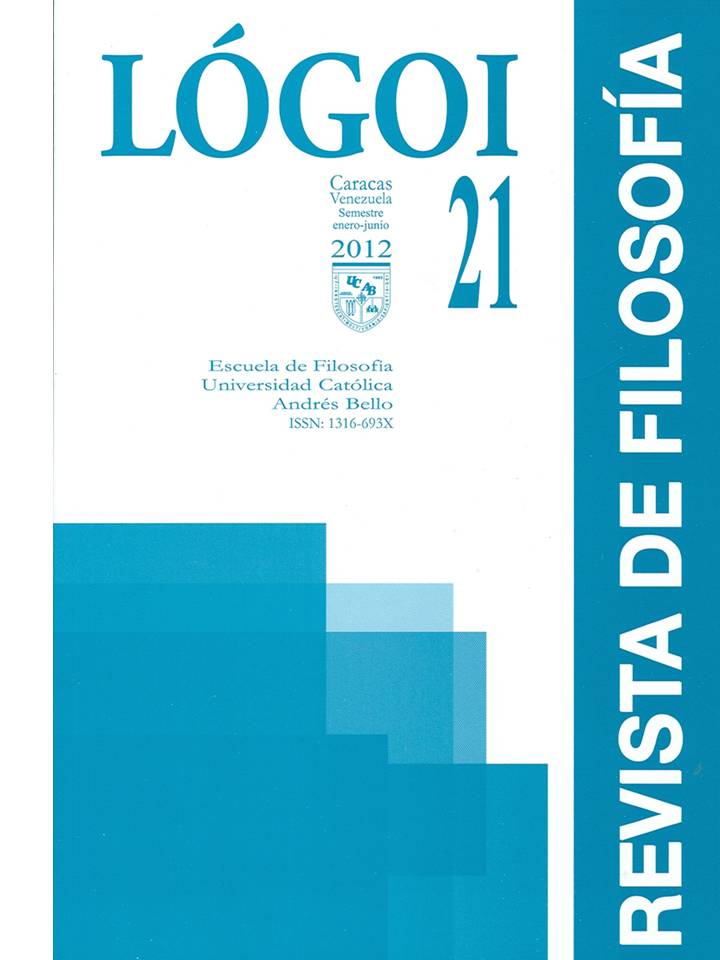
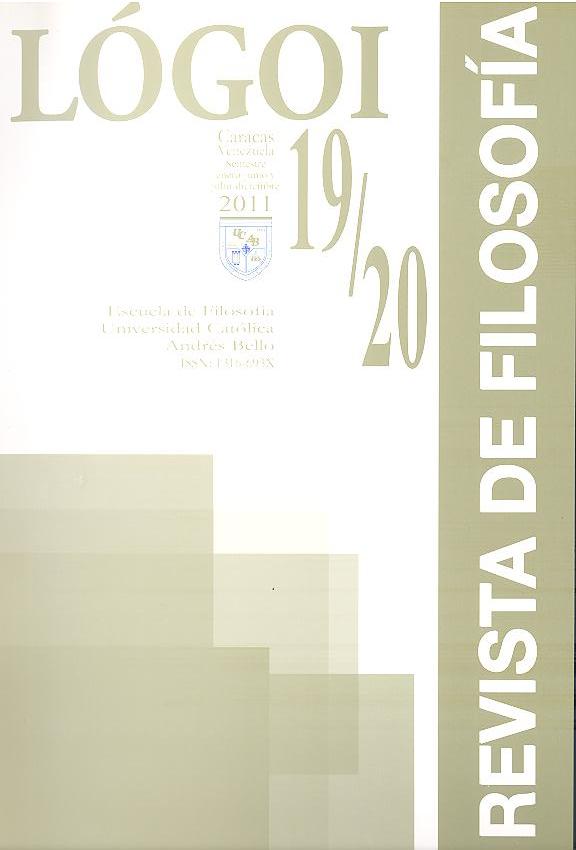
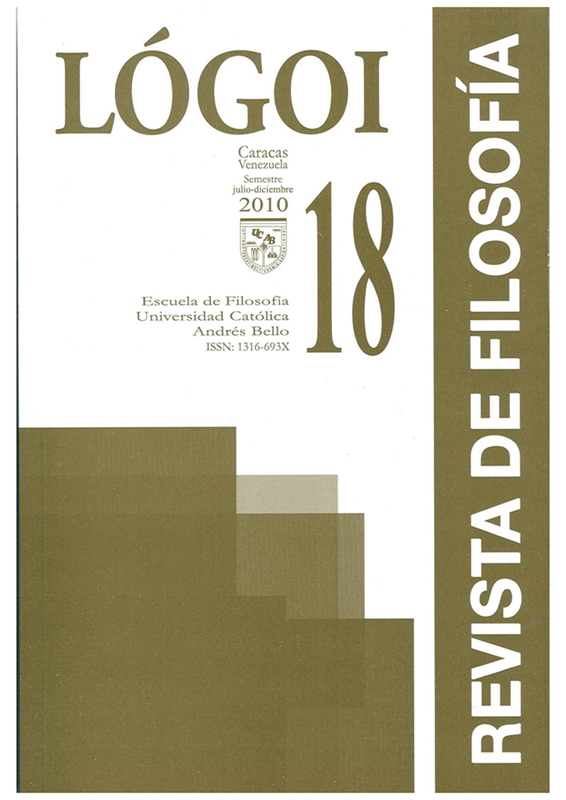
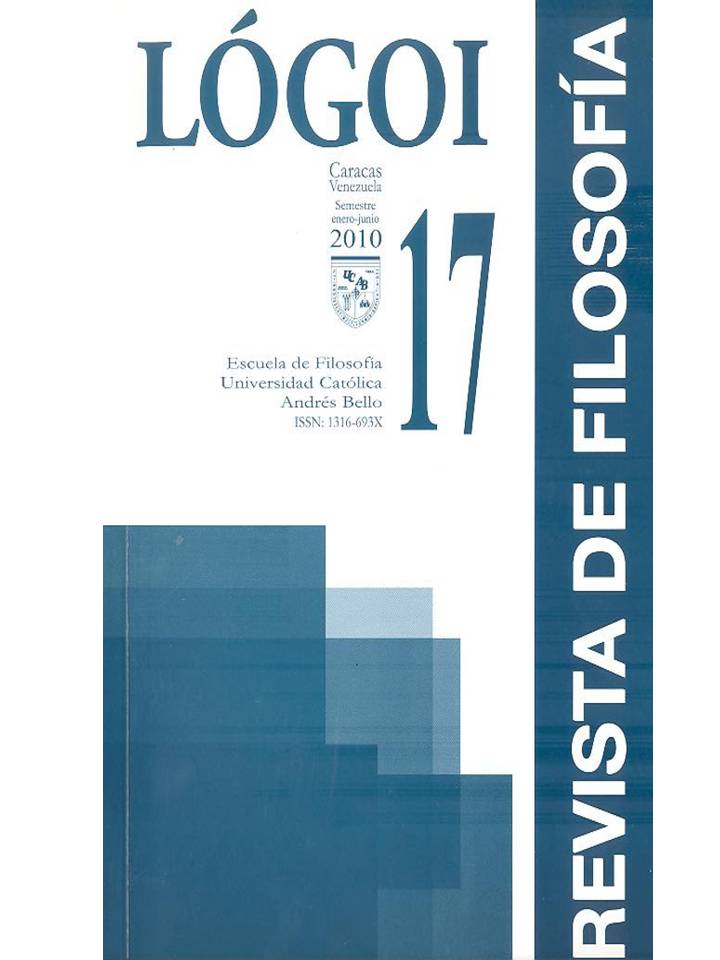





.png)












